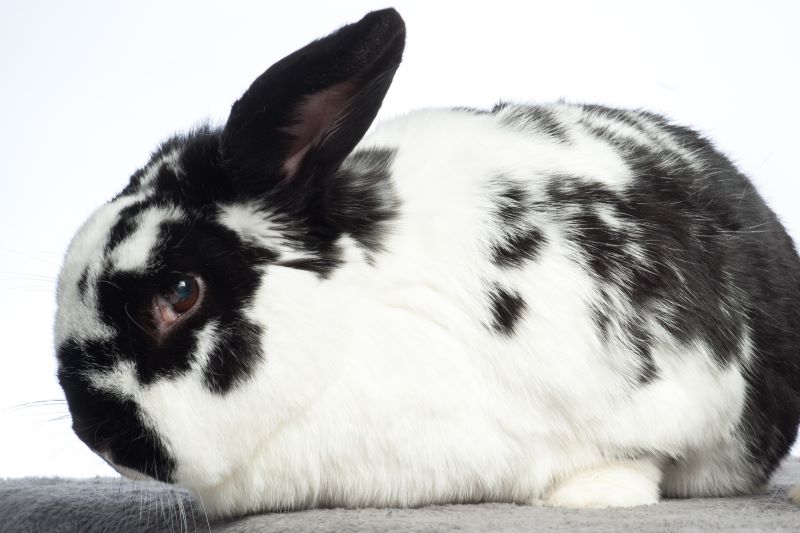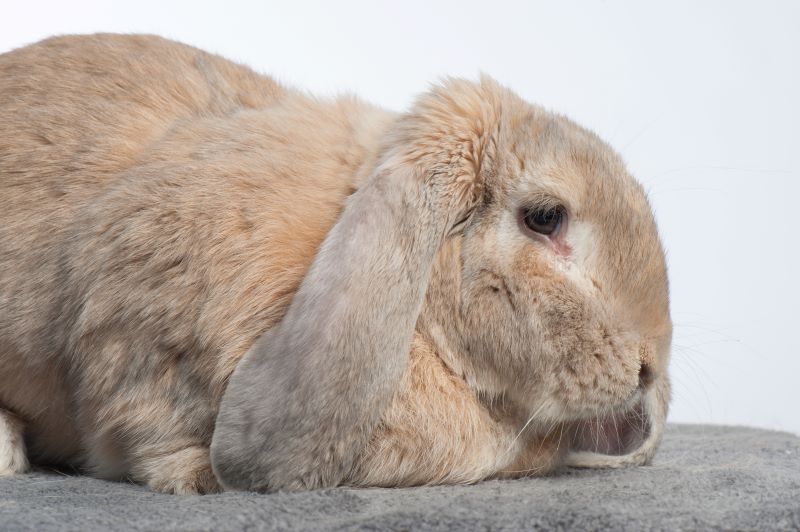New research from the RVC sheds light on common health issues in pet rabbits
Exploring the most common health problems in pet rabbits in the UK, new research from the Royal Veterinary College (RVC) reveals unnatural body shapes along with inadequate diet and exercise as having strong links with poorer health in rabbits. These insights will support ongoing efforts to enhance pet rabbit welfare in the UK, helping owners to recognise and prevent common disorders and providing veterinary professionals with more information around the causes of commonly diagnosed disorders.

As the largest study of its kind on pet rabbits in the world, the RVC’s VetCompass team explored the body shape of 162,017 rabbits under first opinion veterinary care during 2019. The results showed that 79.7% of rabbits with breed information recorded were classified as short-headed (brachycephalic); 16.8% as medium-headed (mesaticephalic); and only 3.51% as long-headed (dolichocephalic). Long-headed rabbits are most similar in body shape to wild rabbits, showing just how much we have changed the furry rabbit friends that we keep as pets today from their original natural conformation.
The RVC team was led by Dr Dan O’Neill, Associate Professor of Companion Animal Epidemiology; Dr Joanna Hedley, Senior Lecturer in Exotic Species and Small Mammal Medicine and Surgery; and Dr Abbie Williams, who was then a final year RVC veterinary student. These researchers also examined the full veterinary clinical records of a random sample of 3,933 rabbits, identifying the frequency of the most common health disorders by first opinion veterinary practitioners across the UK. The most common disorders were overgrown nails (28.19%), overgrown molars (back teeth) (14.9%) and obesity (8.82%) – all of which can be linked to limited exercise and unnatural diets.
Additional findings include that:
- 27% of the study population was recorded as a specific single breed (type) of rabbit, with the remaining 49.72% recorded as either an unspecified cross between various rabbit types or just as a rabbit.
- 05% of rabbits with breed information recorded were classified as lop-eared, a feature that does not commonly occur in nature, with only 42.95% being erect-eared.
- The average adult bodyweight of rabbits overall was 2.26kg.
- Additional common health disorders were identified as dirty bottom (perineal faecal impaction) (7.4%); undiagnosed disorder (6%); not eating (5.77%); gastro-intestinal stasis (5.52%); and tear duct abnormality (3.48%).
- Female rabbits were more prone to obesity while male rabbits were more prone to dental and eye disorders.
- Rabbits classified as short-headed had higher risk of tear duct abnormality, haircoat disorder and dirty bottoms, compared to medium-headed rabbits.
- Rabbits with lop ear carriage had higher risk of dirty bottoms and tear duct abnormality compared to rabbits with an erect-ear carriage.
- The average life span for rabbits was determined as five years and did not differ depending on the sex or skull shape of the rabbit. However, erect-eared rabbits had a longer average life span compared to lop-eared rabbits.

Dr Dan O’Neill, Associate Professor of Companion Animal Epidemiology at RVC, and lead author of the paper, said:
“This new study helps us to understand that the health of our pet rabbits is heavily dependent on the choices we make as owners. Whether that be the body shapes of the rabbits we choose to acquire or the food and exercise we choose to allow our pet rabbits to enjoy, we play an important and influential role in determining whether their health is good or poor.
“This research also tells us that we have the power to improve the lives of our much-loved pet rabbits. Greater awareness by owners on the importance firstly of choosing a rabbit with a more natural body shape and then later on of the value of conducting regular health and cleanliness checks, along with providing good diet and exercise, particularly for unnaturally short-headed or lop-eared rabbits, can make a significant difference to their overall health and quality of life.”
Dr Joanna Hedley, Senior Lecturer in Exotic Species and Small Mammal Medicine and Surgery at RVC, and co-author of the paper, said:
“It is great to have this new research highlighting the common problems seen in pet rabbits. At the RVC’s Beaumont Sainsbury Animal Hospital, our exotic and small mammal specialists see many of these health issues, which can be easily preventable with the right husbandry or treatable if identified at an early stage.
Janet Hughes, Commercial Director at Agria Pet Insurance, said:
“We hope this research will help owners make more informed decisions when acquiring their pet rabbit and throughout their care, leading to happier and healthy owners and rabbits.”
“This VetCompass study into common conditions in rabbits gives a very welcome insight into the very real challenges our pets face, often based on why we choose the pets we do. We're truly grateful to the VetCompass team and all of the practices involved for enabling potential owners to understand more about choosing a healthy pet who will live a full, happy life. It's this educational, research and welfare-led approach makes us proud to support VetCompass and the important work that they do."
Notes to Editors
Reference
O'Neill DG, Williams A, Brodbelt DC, Church DB, Hedley J. Conformation‐associated health in pet rabbits in the UK: A VetCompass cohort study. Vet Rec. 2024;e4396.https://doi.org/10.1002/vetr.4396
The full paper is available from Vet Record and can be accessed at: https://doi.org/10.1002/vetr.4396
The RVC has developed a series of rabbit care fact sheets to further support owners in caring for these animals. These can be found at: https://rvc.uk.com/rabbit-health-factsheets
For more information regarding the RVC’s exotic and small mammal service: https://www.rvc.ac.uk/small-animal-vet/general-practice/practice-services/exotic-vet-service/rabbit-vet
For media enquiries, please contact:
- Jasmin De Vivo at jasmin.devivo@plmr.co.uk or rvc@plmr.co.uk
- Press Line: 0800 368 9520
About the RVC
- The Royal Veterinary College (RVC) is the UK's largest and longest established independent veterinary school and is a Member Institution of the University of London.
- It is one of the few veterinary schools in the world that hold accreditations from the RCVS in the UK (with reciprocal recognition from the AVBC for Australasia, the VCI for Ireland and the SAVC for South Africa), the EAEVE in the EU, and the AVMA in the USA and Canada.
- The RVC is ranked as the top veterinary school in the world in the QS World University Rankings by subject, 2024.
- The RVC offers undergraduate and postgraduate programmes in veterinary medicine, veterinary nursing and biological sciences.
- The RVC is a research-led institution, with 88% of its research rated as internationally excellent or world class in the Research Excellence Framework 2021.
- The RVC provides animal owners and the veterinary profession with access to expert veterinary care and advice through its teaching hospitals and first opinion practices in London and Hertfordshire.
About the VetCompass™ Programme
VetCompass™ (The Veterinary Companion Animal Surveillance System) is an epidemiological research programme at the Royal Veterinary College (RVC) which investigates anonymised clinical records from veterinary practices to generate evidence to support improved animal welfare. VetCompass shares information from more than 1,800 veterinary practices in the UK (over 30% of all UK practices) covering over 28 million companion and equine animals. To date, VetCompass™ has led to over 130 peer-reviewed publications that have supported welfare-focused work across the range of animal stakeholders including the wider general public, owners, breeders, academics, animal charities, universities and government.
For more information, visit: https://www.rvc.ac.uk/vetcompass
X (Twitter): @VetCompass
